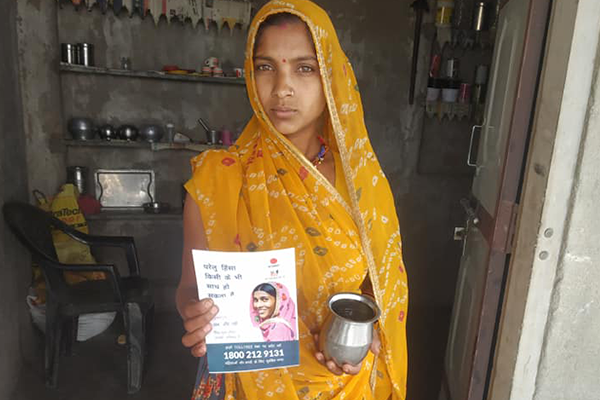Holding a light to the pandemic's dark side
An immediate rise in reports of domestic violence and human trafficking since lockdowns in India has meant swift innovation in the way we protect girls and women.
Early in the pandemic, the rates of gender-based violence and human trafficking shot up sharply around the world. In India, where gender-based violence was already prevalent, reports of domestic violence more than doubled in a six-month period from the start of lockdowns, according to the National Commission for Women.
While lockdowns have been necessary to reduce the community spread of coronavirus, they also have serious psychological and social consequences, known as the ‘quarantine paradox’.
“The [environment created by the] virus mirrored the pre-existing patriarchal notions and magnified the discrimination and pre-existing inequalities, states Shalu Nigam in her paper published in Social Science Research Network.
At greatest risk where they should be safest
The effects of financial stress and restrictions on usual activities have increased violence, and stay-at-home orders have meant women are being trapped with their abusers. COVID-19 has created ‘ideal’ conditions for abusers because their partners or children cannot escape them.
The United Nations has described the worldwide increase in domestic abuse as a ‘shadow pandemic’ alongside COVID-19.
A rise in trafficking tactics
Another immediate result of the COVID-19 pandemic in India was an increase in sex trafficking – traffickers were quick to exploit economic vulnerability and financial pressures for families living in poverty, luring women and children away to be sold.
In the first 11 days of the Indian Government’s lockdown, the Childline helpdesk, which addresses human trafficking, reportedly received 92,000 calls. In addition, the India Child Protection Fund has reported a 95 per cent increase in searches for ‘child pornography’ on sites in India since lockdown began.
Due to these dual threats, interventions have had to evolve to offer women and children more protection.
.jpg)
Creating Safe Villages against trafficking
By using targeted text messages and mass media community radio broadcasts, the Safe Village team at our women’s safety partner My Choices Foundation, broadened the reach of their anti-trafficking and women’s safety awareness messages to 70,000 people per month.
Helplines have become an invaluable way for girls and women to reach out for support. Distressed helpline callers are geographically mapped using the SafeTracker tool, which incorporates data from Operation Red Alert’s implementing partners. Using this digital data collection tool, all helpline callers and local champions of the Safe Village Program who have been trained to be vigilant to risks of child trafficking are contacted regularly with text messages.
“The calls to our helplines vary from a young schoolgirl calling to seek help to stop her friend’s marriage, to calls seeking support to find girls who have been trafficked for commercial sexual exploitation or forced labour,” says Sudha Upadhyayula, Head of HR and Operations at Operation Red Alert. “Our helpline is reaching remote villages and into neighbouring countries too, with calls recently coming from Nepal.”
Cases of women being lured away for jobs in the Middle East or in cities in India is an emerging pattern. Another trend is blackmail using intimate photos. “Covid has increased the vulnerability of women and the incidence of online exploitation and abuse is rising rapidly,” says Sudha.
“Needing to reach out to these vulnerable populations using social media and digital tools, we started building digital education modules aimed at building awareness and knowledge. These modules are designed to be scalable, replicable, and sustainable,” says Sudha. “Our goal is to reach 500,000 people through our modules in 2021.”
Our goal is to reach 500,000 people through our digital anti-trafficking education modules in 2021.

Creating peace against violence
Women affected by domestic violence have also benefited from digital tools.
“We switched gears when the nation went into lockdown,” says Pearl Choragudi, Head of Interventions at Operation PeaceMaker. “Our work was previously very much face-to-face. We moved our programs and counselling services from our offices and field to online modes. We leveraged the use of popular applications like WhatsApp, Google Meet and Zoom to conduct our awareness programs. We launched new helplines and switched to counselling survivors via telephone.”
A focus on data collection has meant the team has been able to reach out to and support women, even during lockdown. The cloud-based case management system, PeaceTracker, helps counsellors access critical client data in real-time.
“Working from their homes, our domestic violence counsellors analyse the client base to identify and proactively reach out to every woman who may be in need of assistance,” says Pearl.
Despite lockdown struggles, 2,092 new clients reached out to Operation PeaceMaker for help in the past year from various sources such as our local helpline, our toll-free national helpline, e-mail, and partners,” says Pearl.
How WhatsApp is helping build safer communities
Our 48 WhatsApp groups for girls and boys have become places to share grievances and get appropriate assistance. Children are regularly engaged in online activities and worksheets to help them understand gender equality.
Almost 2,000 women are part of groups learning how to spot signs of violence, child sexual abuse, how to seek assistance, and their legal rights in domestic violence. “These groups have been extremely important for many women as they came forward about being abused during the lockdown and were able to access appropriate assistance through our counsellors, safe house and partnership with the police,” says Pearl Choragudi of Operation PeaceMaker.
Opportunity's women's safety programs provides valuable education and counselling for domestic violence and human trafficking prevention programs.